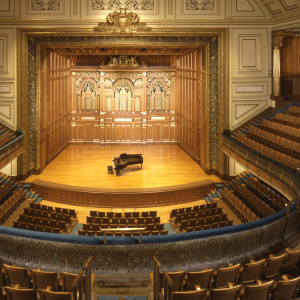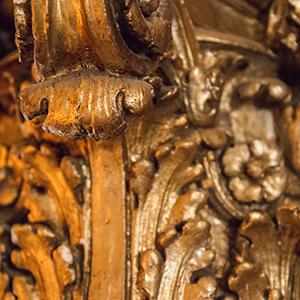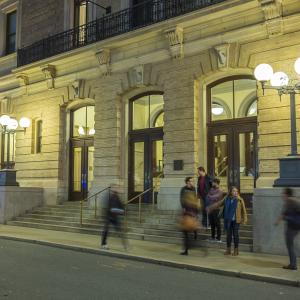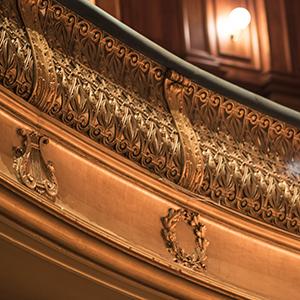We provide educational access through support, resources, advocacy, collaboration, and accommodations for students with disabilities. We are committed to supporting and sustaining an inclusive campus that recognizes disability as diversity. We are dedicated to ensuring individuals with disabilities have an equal opportunity to fully participate in the educational process and Conservatory experience.
Disability Support Services (DSS) at New England Conservatory coordinates reasonable accommodations and services for undergraduate and graduate students with documented disabilities in compliance with Section 504 of the Rehabilitation Act of 1973, the Americans with Disabilities Act of 1990, and the Americans with Disabilities Act Amendments of 2008. Such accommodations may include the use of a note-taker, course materials in alternative formats, extended time in academic settings, as well as housing and other campus-related accommodations.
Information for Students
Students seeking accommodations will first need to fill out the Request for Academic Accommodations Form and schedule an appointment to meet with Disability Support Services. It is important that both Part I and Part II are completed. To schedule an appointment email your completed form to DSS@necmusic.edu.
Accommodations are never retroactive. Be sure to contact our office as soon as possible.
For any questions about accommodations or disability resources please email DSS@necmusic.edu.
Information for Parents
NEC’s Disability Support Services (DSS) knows how hard the college transition can be for both students and parents. This is especially true for parents of students with disabilities who have advocated for their student; collaborated with teachers and administrators; and kept a close, watchful eye on their student’s progress in school.
When students are in high school, parents are expected to help steer their child in the correct direction and help them achieve their goals. When students are in college, however, they need to become the driving force behind their academic success and development into mature adults. Regardless, there are ways our office can partner with you to help your student develop the self-advocacy skills they need.
Partnering to Support Your Student
Though our main role is to work with your student directly, we know that you are an important and critical part of your student’s life. We cannot always share information with you (such as if your student has attended a meeting with our office, whether they have used accommodations, or how they are doing in their classes), but we are always open to hearing information that you think might be important for us to know. If you are concerned about your student, please let us know by contacting us at DSS@necmusic.edu. We may be able to reach out and help them get connected to the best resources on campus.
Note: Disability services are completely confidential.
Tips to Help Your Student with Documents
If your student wants to pursue accommodations at NEC the first step is to have them fill out the Request for Academic Accommodations Form (Parts I and II). Part II does need to be filled out by a physician, psychiatrist, psychologist, or medical professional. In cases of a learning disabilities and/or Attention Deficit/Hyperactivity Disorder (LD/ADHD) the request form should include a psychological or neuropsychological evaluation that is current (not more than 5 years old), and a specific diagnosis with the DSM-V or ICD-10. These evaluations can be expensive and take time to schedule. We recommend that you begin this process before school starts in order for your student to receive timely accommodations.
An Individualized Education Plan (IEP) and/or Section 504 Plan can be submitted along with the medical documentation or psychological/neuropsychological evaluation; however, it cannot solely be used for determination of accommodations. Also, students can submit letters verifying accommodations received during their previous educational experiences (i.e. high school, college, etc.) as well as accommodation memos for standardized examinations (i.e. SAT, ACT, GRE, GMAT, MCAT). Such supporting documents serve to demonstrate history of accommodation; they are not a substitute for medical documentation in accordance with NEC documentation guidelines.
Helpful Books and Articles on the College Transition
- The Happiest Kid on Campus: A Parent's Guide to the Best College Experience (for you and your child) by Harlan Cohen. Harlen Cohen, America's most trusted college life expert, delivers the best advice, facts, stats, tops and stories from parents, students and experts across the country to ensure that you and your child will have an incredible and meaningful college experience.
- What the Best College Students Do by Ken Bain. Combining academic research on learning and motivation with insights drawn from interviews with people who have won Nobel Prizes, Emmys, fame, or the admiration of people in their field, Ken Bain identifies the key attitudes that distinguished the best college students from their peers.
- As Drop-off Looms, A Professor's Note for New College Parents by Nick Anderson of the Washington Post. Advice from a professor about how to manage the protective-parent instinct.
- New College Parents: Lost in the Transition by Brian Harke of the Huffington Post. The author describes three distinct stages parents go through during their child's transition to college.
On-Campus Housing Accommodations
New England Conservatory is deeply committed to the full participation of students with disabilities in all aspects of Conservatory life, including residential life. All students (new and returning) must follow the necessary steps and provide all required information in order to be considered for a housing accommodation.
Housing accommodations are only based on disability-related needs and are determined on a case-by-case basis.
Students requesting special accommodation or modification to Conservatory housing must complete and submit the DSS Housing Accommodations Form and the appropriate documentation in order to receive consideration. Your request will not be fully considered until this request form and all other necessary supporting documentation has been submitted. (Please note that this form is not the Housing Application for incoming first-year and transfer students planning to reside within on-campus housing. A specific email will be sent to all incoming NEC students regarding updates to Fall semester housing in due time, and Student Services appreciate your patience.)
*Please note that should you also require reasonable academic accommodations, you must additionally fill out the Request for Academic Accommodations Form (below) and submit it to Disability Support Services (DSS) within the Office of Student Services. Housing and Academic accommodations will be considered independently.
Service Animals and Emotional Support Animals
As part of the Conservatory’s commitment to accommodate persons with disabilities, particularly persons who need the assistance of service animals, the Office of Student Services has developed the following guidelines to address service and assistance animal requests and usage on New England Conservatory’s campus.
Different provisions govern the use of Service Animals and Emotional Support Animals, depending on the context in which the accommodation is needed. The term Service Animal and the guidelines outlined in more detail below are based upon the provisions outlined in the U.S. Department of Justice’s revised regulations for implementing the ADA for Title II and Title III (for State and Local Governments and Title III requirements for Places of Public Accommodation). These rules govern the availability of a Service Animal as an accommodation in public spaces on campus. For more details on DOJ’s guidance on service animals, please refer to: http://www.ada.gov/service_animals_2010.htm.
The term Emotional Support Animal (ESA) and the guidelines are based upon the Fair Housing Act (“FHA”). These provisions apply only to students who live in the residence hall. In the context of housing, disabled persons may request a reasonable accommodation for assistance animals in addition to dogs, including emotional support animals under the Fair Housing Act or Section 504 of the Rehabilitation Act. Students requesting an Emotional Support Animal accommodation must complete and submit the DSS Housing Accommodations Form, the ESA Registration Form, and the appropriate documentation in order to receive consideration. Your request will not be fully considered until this request form and all other necessary supporting documentation has been submitted.
Definitions
Service Animals:
The ADA defines service animals as dogs that are individually trained to do work or perform tasks for a person with a disability, including physical, intellectual or other mental disability. According to ADA, to qualify as a Service Dog, the dog:
- must be specifically trained to perform certain tasks; natural dog behaviors do not qualify;
- must mitigate the person's disability;
- must be needed by that specific handler.
The law obligates state and local governments and any places that are open to the public to permit service animals to accompany people with disabilities anywhere members of the public are allowed to go. Service dogs are not required to wear a vest or any other item notifying others of their status as a service animal.
Emotional Support Animals:
Emotional Support Animals (ESAs), sometimes referred to as “comfort animals,” or “companion animals,” are animals whose presence alone has a positive effect on an individual with a disability. ESAs are not trained to perform a task or service. ESAs are not considered service animals under the ADA or the Massachusetts law regarding service animals. ESAs do not have access to public areas as do Service Animals.
Responsibility of Persons with Service Dogs or Emotional Support Animals
- The animal must never be on NEC’s campus without being attended and under the control of the handler with the exception of within the resident’s room in the residence hall. This means the animal must be on a leash or in a carrier or cage. The owner is liable for all actions of the animal and should be in total control and restraint of the animal at all times.
- The owner must clean up all messes immediately. Any waste material, including litter, should be placed in a plastic bag and disposed of in an outside trash receptacle, such as the dumpster next to Jordan Hall. Indoor trashcans should not be used for this purpose.
- The animal must be properly cared for and nourished.
- The animal must not be unduly disruptive or pose an immediate threat to others.The Office of Student Services shall be responsible for making such determinations about an animal’s conduct within the Residence Hall and on other Conservatory property. If a decision is made that an animal has been unduly disruptive or poses an immediate threat to others, the animal must be removed immediately. The owner may appeal the decision within 2 business days. The appeal shall be in writing and delivered, as appropriate, to the Dean of Students. A decision on the appeal will be made within three business days of receipt of the appeal and will be final.
- In the event that the Office of Student Services determines that an animal should be removed from campus, including the Residence Hall for disruptive behavior, provided the decision is not based on the animal posing an immediate threat or being unduly disruptive (see 4 above), the owner shall be given written notice to remove the animal within 48 hours. The owner will have 24 hours to respond. The response, if any, will be reviewed and a final decision made within the same 48 hour period. The decision of the Dean of Students, or her/his designee, shall be final.
- All liability for the actions of the animal (bites, scratches, running away, etc.) are the responsibility of the owner. The Conservatory encourages owners to consider appropriate liability insurance.
- If the owner takes vacation or has extended leave (more than 24 hours), the animal must be removed from the Residence Hall.
- If the owner resides in the Residence Hall, the owner will notify the Director of Residence Life if the animal escapes.
- Necessary precautions should be made for Building Operations and other Conservatory personnel to enter the residence hall room when the owner is not present. The animal must be caged or crated, or removed from the room, during the time that personnel are in the room. The Conservatory is not liable if the animal escapes during one of these visits.
- The owner of an approved animal in the residence hall will provide Disability Support Services the emergency contact information of an individual who will be on call to care for the animal in the event the owner is unable to care for the animal.
- Owners of animals are solely responsible for any damage to Conservatory property caused by the animal. This shall include, after the owner vacates the premises, any cleaning outside that routinely done for any room. Cleaning services outside those routinely performed may include, but are not limited to, steam cleaning of all carpets and drapes, and abatement for fleas or other pests and odor. If furniture requires replacing, that also shall be the responsibility of the owner. Any such fees will be posted to the owner’s individual student account and/or deducted from the student’s housing deposit.
For more information about NEC's policy on Services Animals and Emotional Support Animals including an FAQ, please see the Policy and Guidelines for Service and Emotional Support Animals at New England Conservatory below.
Resources:
Section 504: Protecting Students with Disabilities
Americans with Disabilities Act Amendments






